by Ben Cheney
語言:
English
Photo Credit: Brilliant Time/Facebook
A FEW MINUTES’ walk past the Nanshijiao end of the MRT Orange Line, past the Texas Instruments facility, the Taiwanese commercial foliage lifts and a portal is revealed. Brilliant Time Bookstore (燦爛時光:東南亞主題書店) opened on April 12, 2015, becoming a hub of activity for Southeast Asian migrant workers in Taipei and Taiwanese who wish to better understand them. Zhang Zheng (張正) is the founder and “chief”, his term, of Brilliant Time, which is certainly not the typical “bookstore”.
Multiple floors of labyrinthine shelves, the moving customers jostling past those stopped to sample a book? This is not Eslite. The first floor has an inventory of communal books from across Southeast Asia surrounding couches and chairs, and the second floor is for lectures and film screenings. Flags and other national paraphernalia from across Southeast Asia decorate the place alongside photos of store events and migrant life. After discovering Brilliant Time through the showing of the film “Squid Jigging Fishing Boat” (水路一遠洋紀行), a portrait of a Taiwanese fishing boat and the migrant laborers who empty the waters and fill the galleys, I had the pleasure of sitting down with Mr. Zhang.
Ben Cheney: What is your overall goal or purpose?
Zhang Zheng: Our purpose is for the Southeast Asian people in Taiwan—we hope they have some books to read. We have many Southeast Asian language books. Many of these books are books which Taiwanese have brought back from Southeast Asia. We have a program called “bring a book that you cannot read”. Half our books are in Southeast Asian languages, and the other half are in Chinese. The Chinese books talk about migrants and other Southeast Asian topics. We hope Taiwanese people can know more about Southeast Asia and the outside world.
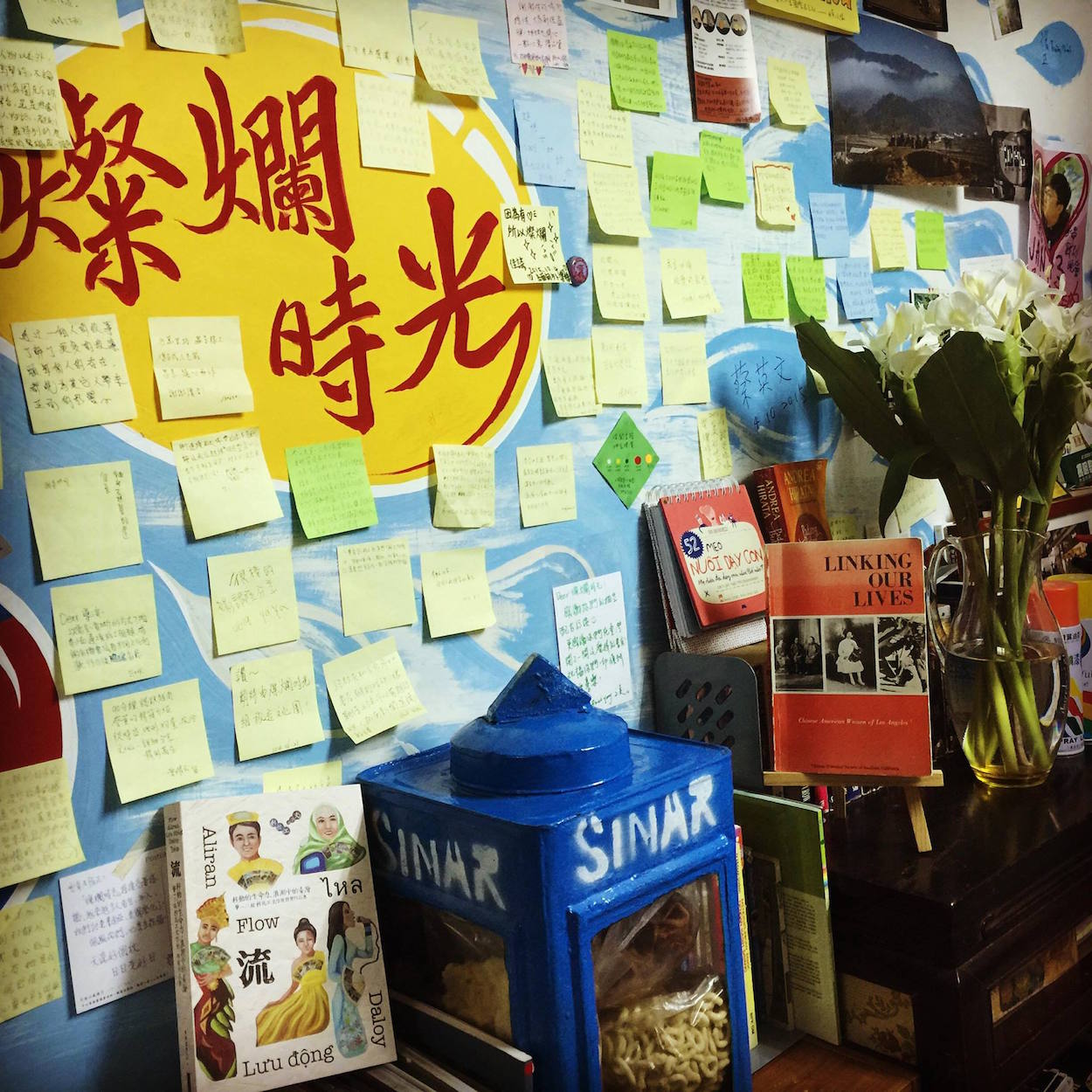 Photo credit: Brilliant Time/Facebook
Photo credit: Brilliant Time/Facebook
BC: How did you come up with the name “Brilliant Time”?
ZZ: Well, it means that when Southeast Asian people can read books from their respective cultures, their eyes will light up—that is their “brilliant time”. For Taiwanese people the brilliance is when they can know more about the world. All people can have their own “brilliant time”.
BC: Was there one single experience or motivation that inspired you to open this place? Or was there a general interest in helping Taiwanese people and Southeast Asian migrants understand each other better?
ZZ: My main purpose is for Taiwan, for us to be a better society. How can we reach this target? I hope everyone here around me, Taiwanese, and foreigners, they can have better information to give them a sense of the world and to express their own opinions. Of course, before I built this bookstore I was a journalist. I feel speaking out and spreading information are very important, so then I built this bookstore. We believe the book is a tool—although it is a very old tool, it is still essential to communication and understanding.
BC: Why did you decide to open here? Did it have anything to do with the nearby “Burma Street”?
ZZ: That was an important reason. We need to be in an area with an established migrant population. Another important reason is that I live near here. I don’t have to go far to get to work. The MRT is very close.
BC: If you come all the way out here from Taipei City, the atmosphere is very different.
ZZ: Yes, and it’s much cheaper here. Maybe that is the most important reason.
BC: Why do you call yourself a “bookstore” if the books you have are for lending/borrowing and sharing, and people can even write in the books? You have a book sharing service, you have talks, you have film showings, you have guided tours… You do many things, but you don’t sell books.
ZZ: “Bookstore” is easier for people to remember. Why don’t I sell books? Nobody wants to buy books here. They want to buy them over the Internet—there books are cheaper, more quickly delivered, and much more numerous. Although we call ourselves a bookstore, nobody wants to come here just for books—well, a few people do. I wanted to create a new system of book sharing, not sales.
BC: Well, it’s much more of a cultural or community center than a bookstore.
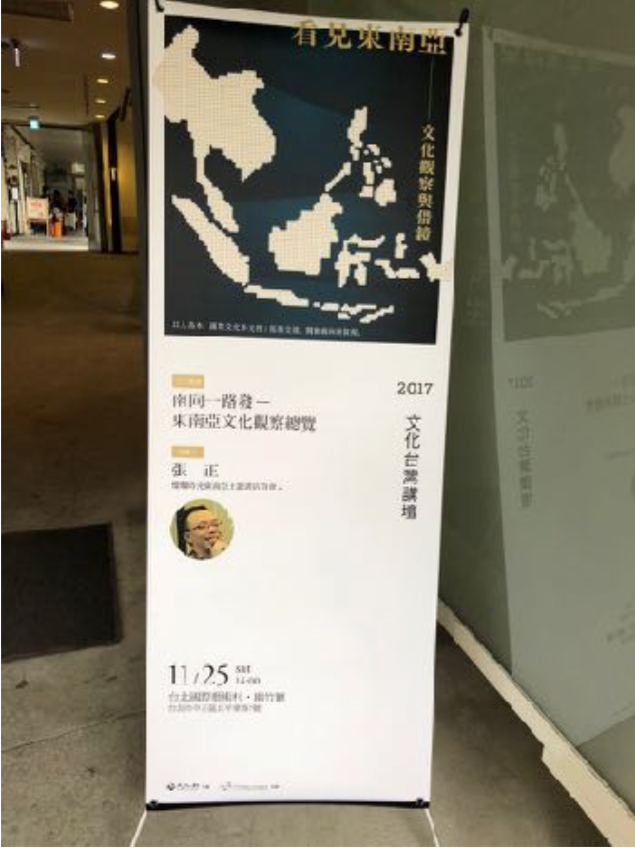 Photo credit: Ben Cheney
Photo credit: Ben Cheney
ZZ: Bookstore is easier. In Taiwan “cultural center” implies that it is run by the government. It sounds too serious and not interesting.
BC: And you make it clear that this place has a special Southeast Asian theme—it’s not just another bookstore.
ZZ: The term “bookstore” has a lot of value. In Taiwan general bookstores have been replaced with independent, niche bookstores, and I caught this tide. I built an independent, alternative bookstore that can catch people’s attention. Our theme is special. Also, no one would come here if I just called it a “library”.
BC: You can’t write or draw in library books.
ZZ: No, you can’t.
BC: How long has there been migration of Southeast Asian labor to Taiwan?
ZZ: From 1989. That year the Taiwanese government began to accept migrant laborers from Thailand, and in 1992 the government allowed the private sector to accept labor from across Southeast Asia.
BC: Why Thais first? Now most foreign laborers are Indonesian, Filipino, or Vietnamese.
ZZ: The Thai government already permitted exporting labor. So did the Philippine government. Indonesia, Vietnam, and other countries allowed workers to go abroad later—perhaps 10 to 15 years later.
BC: Do you think Taiwanese attitudes towards migrants have changed for the better? How much prejudice is there still?
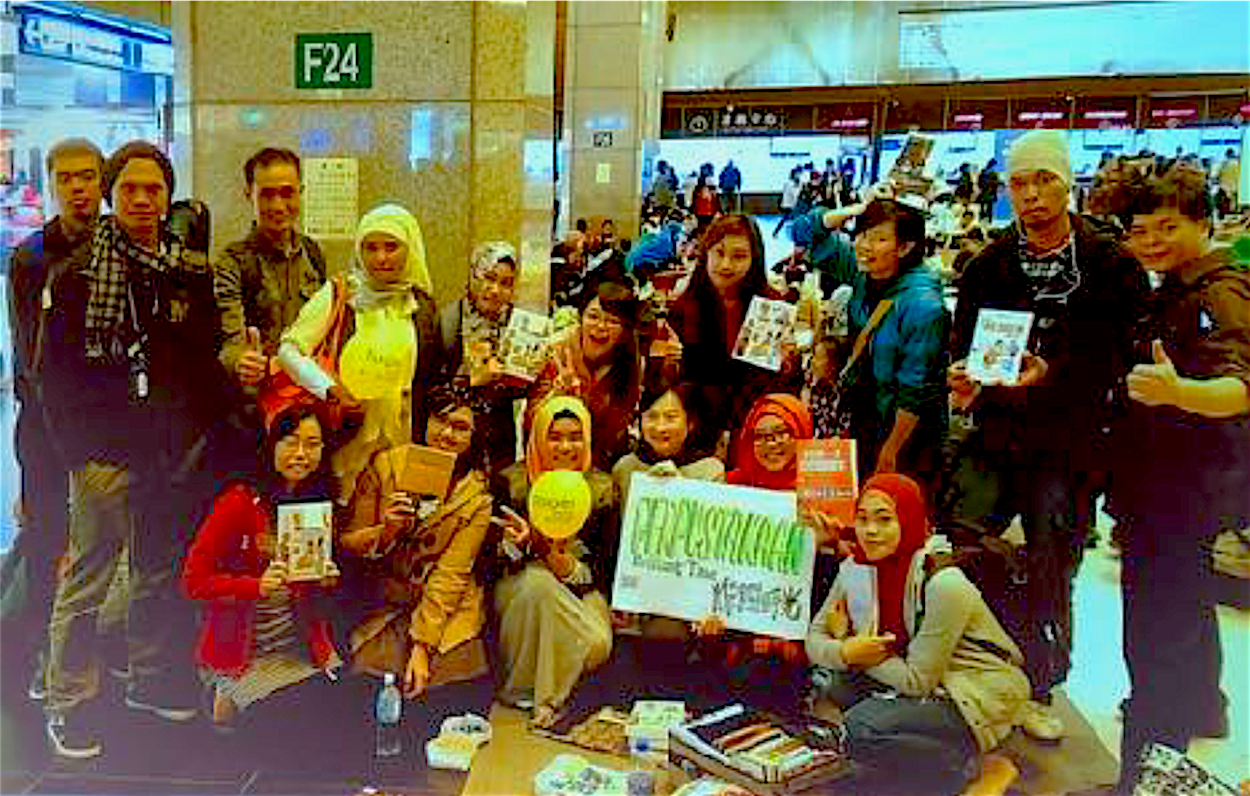 Photo credit: Ben Cheney
Photo credit: Ben Cheney
ZZ: Over the past 20 to 30 years Taiwanese people have learned much, much more about Southeast Asia. I can’t say the general attitude has improved for sure, but there is much better knowledge. And now that our government has the New Southbound Policy—
BC: I wanted to ask you about that. I know that the NSP is designed to increase Taiwan’s business ties with Southeast Asia and India and decrease economic dependence on China, but how does the NSP affect migrant laborers?
ZZ: I think the policy is good for migrants in Taiwan, and good for Taiwanese people. I don’t think the policy will have much effect on business and investment which is already happening, but it will only further improve cultural understanding. The general public in Taiwan will learn more and more about Southeast Asia and be able to communicate better with the migrants. Also, Taiwanese economic involvement with Southeast Asia finally has a slogan. Economically, the NSP doesn’t do much, but in terms of cultural exchange and understanding, it does a lot.
BC: I saw the photo downstairs of President Tsai Ing-wen visiting here in 2015. Did she just come here for a quick photo shoot like most politicians or did she stay here longer?
ZZ: She was here for half an hour.
BC: What did she do here?
ZZ: President Tsai actually came here before she was president, back when she was just a candidate. This was in April 2015. She talked about Southeast Asia and donated some books from Vietnam.
BC: Did she lend any books?
ZZ: No, she didn’t. After her visit, then-President Ma Ying-jeou visited as well.
BC: Really? I didn’t see his picture. What did President Ma do here?
ZZ: Well, when he was here there was a very large media presence. Both Ma and Tsai spoke in careful, politically correct language about how understanding and accepting the migrant population is important.
BC: You have lectures, you have film screenings, you have walking tours of such places as the “Little Indonesia” around Taipei Main Station—what other special activities do you do?
ZZ: Next year we will have a new event, an open reading series where people can share what they want, in various languages, not just Mandarin and English. It will be a weekly event in Taipei Main Station. We hope that holding the event in such a public location will get more people interested. Of course there will be lots of Indonesians there, reading works aloud in Bahasa.
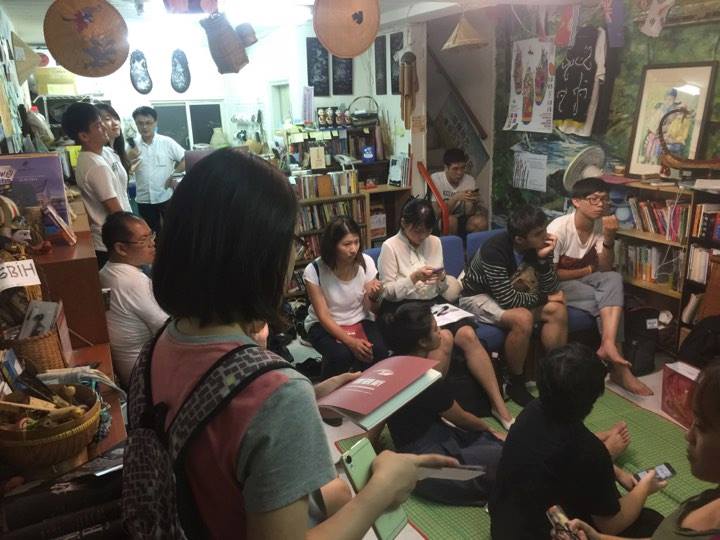 Photo credit: Brilliant Time/Facebook
Photo credit: Brilliant Time/Facebook
BC: I have some questions from the slides from yesterday’s presentation—let me look through the pictures. Why are certain professions dominated by a particular nationality and/or gender? For example, why are many Vietnamese women nurses and many Vietnamese men factory workers? Why do different nationalities do different jobs?
ZZ: It depends on the bosses’ preferences. So many social workers (which usually means working for a family) are Indonesian and Vietnamese women—actually, now Vietnamese social workers are banned from Taiwan because they have a problem with running away.
BC: Many Indonesians run away too, I see. The number of runaway laborers has decreased but it’s still high. Is there a reason why Vietnamese and Indonesian laborers are more likely to run away?
ZZ: Well, a major advantage that workers from the Philippines have in Taiwan is they are much better at bargaining since nearly all of them speak English already. They are also much more used to working overseas, so flight is rare, though not nonexistent, among them. Instead of running away they can bargain with their employers or ask for help from the Philippine Representative Office in Taiwan. There is much less Thai labor than before, but Thais are still prevalent in factory work and construction. Thai laborers come over in groups, not alone like other nationalities. They have strength in numbers—it’s much easier to mistreat a lone migrant worker.
Thai migrants are also unlikely to flee. Indonesian women come over here by themselves to work for a family, they are lonely, they lack bargaining ability… the easiest way for them to improve their situation is running away. Ten years ago this scenario was so common among Vietnamese laborers of all kinds. When workers escape, they can blend into their migrant communities and get help from their compatriots, but marriage migrants, of which Vietnamese women are a large proportion, cannot escape like this.
BC: Doesn’t the government try to catch runaway laborers?
ZZ: Of course. Most of these runaways want to make the most of their chance in Taiwan, however, so through their fellow migrants they find another, illegal job.
BC: You still have these migrant workers doing the jobs that locals don’t want, as is the case in many countries around the world.
ZZ: Exactly.
BC: I see Cambodians are banned entirely from working in Taiwan. Why is this?
ZZ: Cambodia and China are extremely close allies. There is no representation of the Taiwanese government in Cambodia whatsoever. If something happens to a Taiwanese person in Cambodia the Cambodian government will treat him or her as a Chinese citizen. Cambodia also banned marriage migration to Taiwan, presumably at China’s request. Cambodia claims that Taiwanese husbands tend to abuse their wives, along with South Korean husbands—Cambodia also bans marriage migration to South Korea.
 Photo credit: Brilliant Time/Facebook
Photo credit: Brilliant Time/Facebook
BC: Filipinos are very prevalent in the electronics industry, I see.
ZZ: Their English ability is a major reason for that, and they have higher levels of education as well. In the electronics industry all the Filipino workers have university degrees.
BC: People tend to associate Filipinos and Indonesians with domestic work such as nursing and cleaning.
ZZ: Well, this is Taiwanese families’ decision. Filipinos are popular choices because they can speak English. Indonesians have a reputation for obedience.
BC: Going back to foreign marriages—it is much more common for a Taiwanese man to marry a foreigner than it is for a Taiwanese woman. I know about 10 to 15 years ago there were more men than women in Taiwan but now the ratio is basically equal, not like China with its huge male surplus. Now that there is gender population parity what is the appeal of a foreign bride for a Taiwanese man? Especially Vietnamese women?
ZZ: Well, Vietnamese are quite similar in culture and tradition. Most of the Indonesian wives are of Chinese descent as well.
BC: Indonesia is a predominantly Muslim country. What is the general attitude in Taiwan towards Islam? How do major religious differences with Taiwan, especially Indonesian Muslims and Filipino Catholics, factor into migrants’ experiences?
ZZ: There are many Indonesian migrants in Taiwan, but only a few of them are marriage migrants—these are the Overseas Chinese, mainly Hakka. This is because of the large religious and racial differences between Indonesia and Taiwan. Vietnam on the other hand has had a large Chinese influence upon its religion, culture and society throughout history, and there don’t seem to be as major racial differences. Thailand and the Philippines do not have this commonality. Another thing about Vietnam is that over the past 20 years as many Taiwanese businessmen have sought opportunities there, of those who have failed, many have instead become matchmakers for Taiwanese grooms and Vietnamese brides.
BC: The divorce rate between Taiwanese husbands and foreign wives is pretty high. Any particular reasons, not just “I don’t love you anymore”?
ZZ: Many foreign wives come here to learn Chinese and make money. Their Taiwanese husbands are not so accommodating—they want diligent housewives who work harder than they do. After ten years of immersion in business and language, even with motherhood, the wives think their marital work is done and want out. If both husband and wife work equally hard, the marriage will succeed. Many a Vietnamese restaurant in Taiwan is the result of a successful international marriage.
 Photo credit: Brilliant Time/Facebook
Photo credit: Brilliant Time/Facebook
BC: Of course foreign spouses have to stay in Taiwan long-term. Do any foreign laborers end up staying long-term or do they return when their time is up? Do any of them end up becoming residents, and not just for marriage?
ZZ: I’m not sure of the exact number, but very few foreign workers stay long term.
BC: I see the literature award for migrants you have created—how are you trying to let people know about it?
ZZ: First prize is $100,000 NT. That’s a lot of money. Our advertising budget primarily is spent on Facebook.
BC: What about the Burmese population? There isn’t much information about it, but has it grown since Burma/Myanmar began to open up more to the outside world?
ZZ: The Burmese population is very large. Most of these Burmese are of Chinese ethnicity, and migration is because of established family links here. There is no significant presence of Burmese labor in Taiwan because Burma is another very close ally of China. For now the labor from other countries is sufficient.
BC: One Southeast Asian country noticeably absent is Malaysia. Is their lack of migrant presence in Taiwan due to Malaysia’s relatively high level of economic development and their very large Chinese minority?
ZZ: Yes, although many Chinese Malaysian students come to study in Taiwan.
BC: Would you consider Taiwan is becoming a more multicultural place? Recent history has given more attention to the Indigenous Taiwanese as well as the various subgroups of Han Chinese, whether Hakka, people who migrated from Fujian centuries ago, or people who left China in 1949 as the Communists emerged victorious. Younger generations largely identify as Taiwanese, not Chinese. Now of course there is the increasing foreign migrant population.
Has recognizing the diversity already within Taiwan helped better understand and appreciate these new arrivals?
ZZ: We are not a nation of immigrants like the United States or Canada, but step by step, we are becoming more diverse.
BC: Europe is made of nation-states with separate national identities, a major reason why there has been a broad nationalist backlash since the refugee crisis began there. Taiwan doesn’t have this overt anti-immigrant sentiment, but it is still an ethnostate. What is Taiwan’s future?
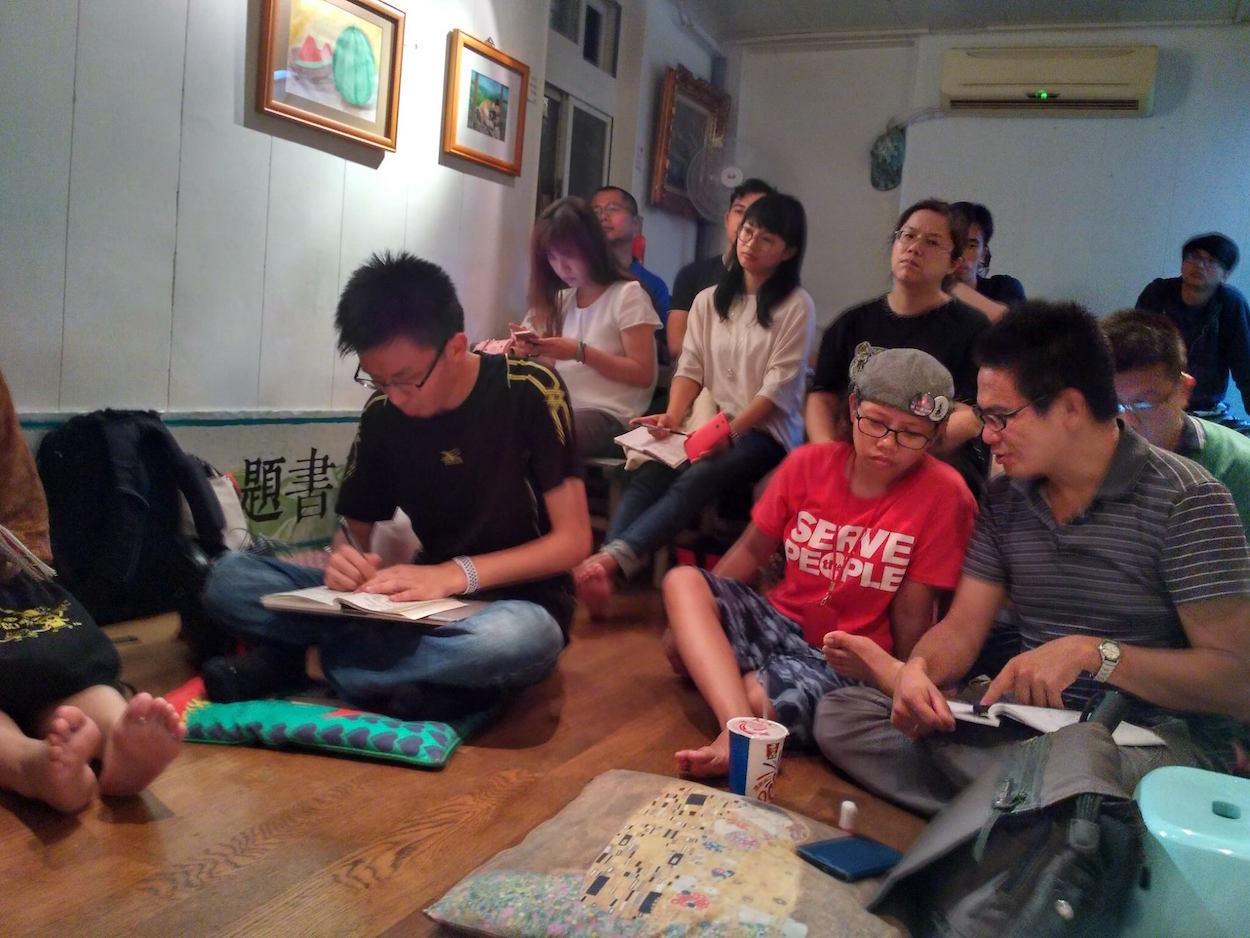 Photo credit: Brilliant Time/Facebook
Photo credit: Brilliant Time/Facebook
ZZ: Taiwan hasn’t prepared for the long term effects of immigration, but now it has no choice but to get ready. We try to review our history and say that Taiwan has always been multicultural. Even that is not quite true because most people are Han Chinese, but that is a huge ethnic category with many subgroups. Multiculturalism is best used as a tool to understand each other. Three hundred years ago Hakka and Minnan people were killing each other in Taiwan, and now they live in peace. Taiwan must choose if it is going to be accepting of more diversity or choose the ethnostate model of Japan or both Koreas.
BC: Foreign labor is so important to the Taiwanese economy that I imagine a Japanese-style migrant policy would be extremely destructive.
ZZ: Yes, it would.
BC: Do most foreign laborers live along the heavily industrialized west coast, from Taipei to Kaohsiung? Is there any foreign presence in the center or along the east coast?
ZZ: There are actually many foreign workers on the east coast—fishing and domestic work. Penghu also. Many foreigners also work illegally on tea plantations or fruit groves in Nantou.
BC: You touched upon this in your talk, but what would you say is the major difference between the groups who migrate to Taiwan for work and those who migrate to Hong Kong or Singapore?
ZZ: In Hong Kong and Singapore the work is limited to domestic care.
BC: To help Taiwanese and migrant workers better understand each other, what do you think is the responsibility of the government, and what is the responsibility of private organizations including yourself?
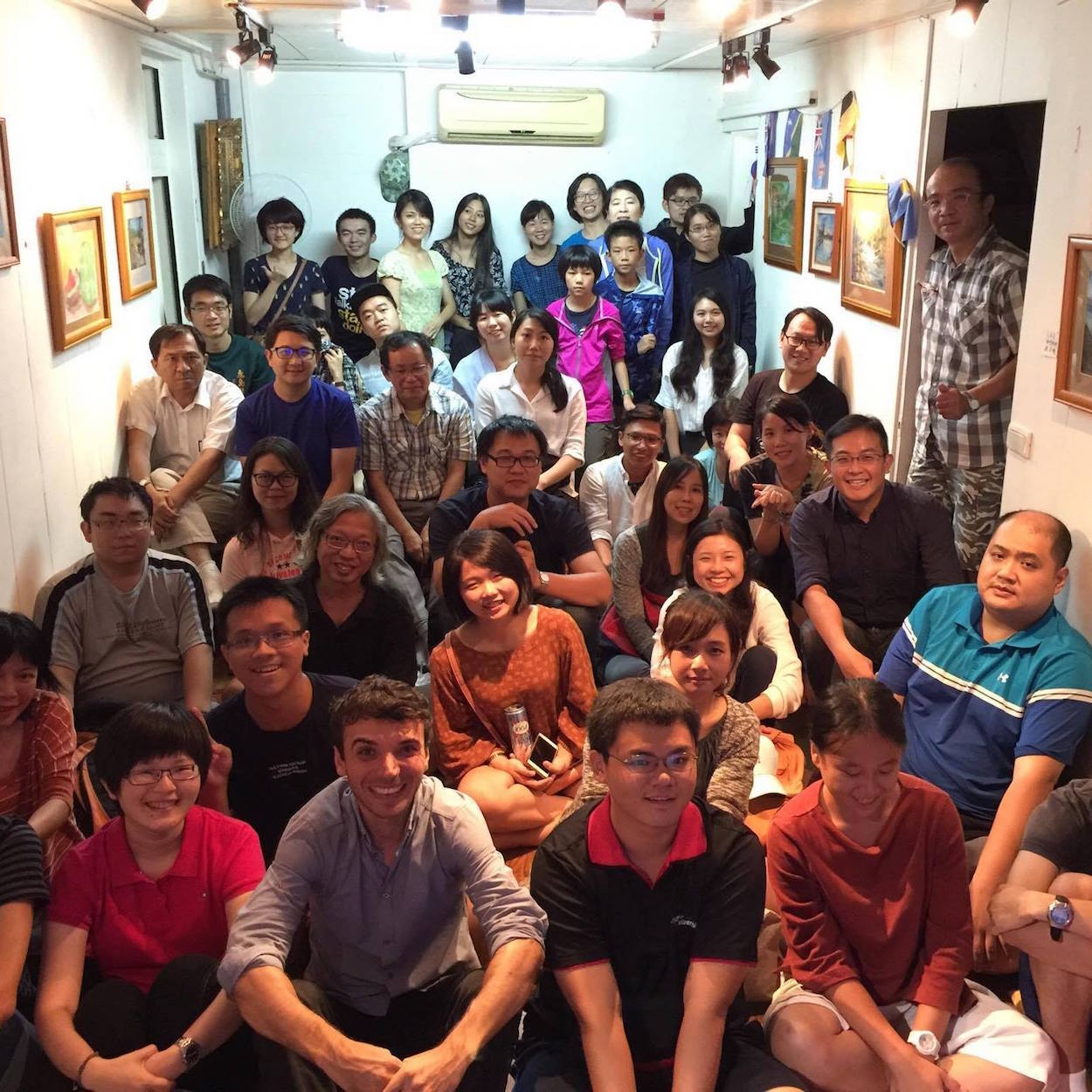 Photo credit: Brilliant Time/Facebook
Photo credit: Brilliant Time/Facebook
ZZ: Responsibility belongs to everyone. Taiwan needed more labor as its economy grew so we imported labor. We thought of them as labor, not as people. Big business made labor policy as met its needs, and government policy followed business. We didn’t plan for them for the long-term, and we tried to control them even when not working. Despite their cultural, racial, and religious differences they are humans with the same desires as everyone else. If there is change for the better it will come from our imaginations. With increasing exposure to migrants, whether through marriage, work, or somewhere else, the Taiwanese people have more and more information with which to make wise decisions. Big business is no longer the sole arbiter of migrant labor policy. I hope that Taiwan will become a more humane and accepting place.

